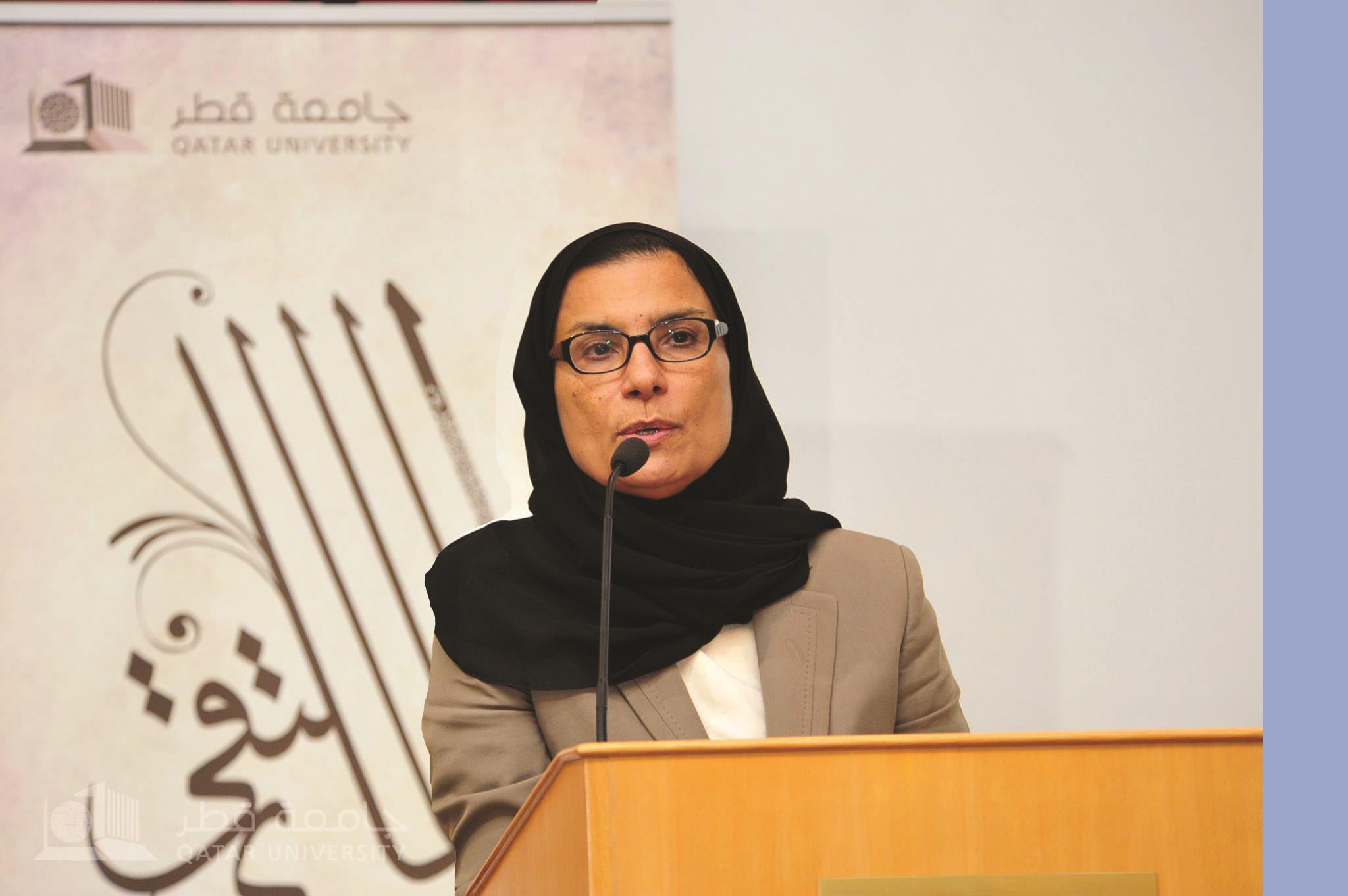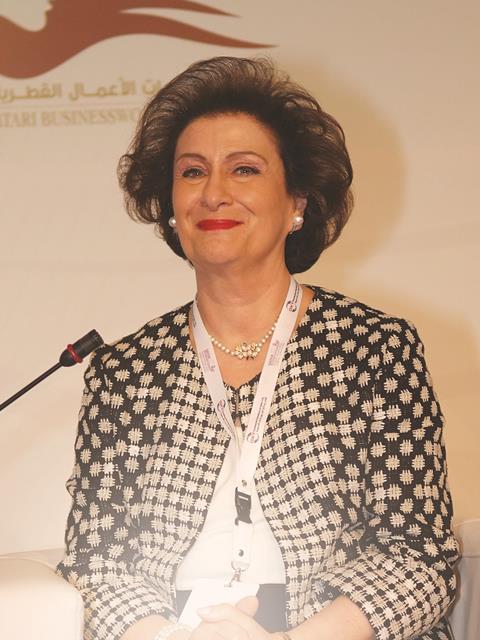It may come as a surprise to some readers that Qatari women have participated in the country’s workforce for decades! Originally within traditional Bedouin and pearl-fishing cultures where women were (among other things) weavers of their community’s vital shelters, in charge of the livestock, the primary traders, or the major family decision-makers and providers whilst their men were away in the desert or at sea for months at a time. Then, from the 1960s and 70s they became an important part of the economy of modern Qatar.
Originally the spectrum of women’s employment choices and opportunities in the State was fairly limited. But today we have numerous examples of successful Qatari women in such diverse fields as aeronautical, mechanical, civil or petroleum engineering; as doctors, lawyers, economists, educationalists, bankers or diplomats; researchers, journalists, writers, poets and broadcasters; photographers, artists, artisan perfumiers, culinary professionals and fashion designers; sportswomen and rally drivers. Qatari women have become ministers, CEOs, entrepreneurs, heads of NGOs and charitable foundations … the list just goes on and on.

In 2015, HE Sheikha Al Mayassa bint Hamad Al Thani, Chairperson of Qatar Museums Authority, was named one of the three most powerful Arab Business Women in the world by Forbes magazine. Other Qatari women in the Forbes list included: QNB Capital CEO, Mira Al Attiyah; HE Dr Hanan Al Kuwari, Minister of Public Health and Managing Director of Hamad Medical Corporation; and HE Sheikha Hanadi Al Thani, the founder and chair of the 17-year-old asset management company Amwal who has been credited with launching Qatar’s first mutual fund.

HE Dr Hessa Sultan Al Jaber was also named as one of the 10 Most Powerful Arab Women in government. One of Qatar’s three female ministers and the head of the Ministry of Information and Communications Technology (ictQATAR) for more than a decade, she has a BSc in Engineering from Kuwait University, and a Master’s Degree and PhD in Computer Science from George Washington University in Washington, DC. She left the Cabinet in January 2016, when, as part of the State’s consolidation process, the ministry was merged with The Ministry of Transport, but in June 2016 was appointed as one of two Qatari members of the Supervisory Board of German automaker, Volkswagen, replacing HE Akbar Al Baker.

On the diplomatic front, HE Sheikha Alya Ahmed bint Saif Al Thani is currently Qatar’s Permanent Representative to the United Nations. She comes from a family of distinguished diplomats and gained her first degree, in economics, from Qatar University then an MA in International Studies and Diplomacy from SOAS, University of London in 2006.
Women’s participation in sport developed relatively slowly in the country, but was speeded up by the establishment in 2000 of the Qatar Women’s Sports Committee. Shorouq Al Sowaidi began practising under the auspices of the Qatar Golf Association in 2004 and represented Qatar in the 2006 Doha Asian Games.
 Yasmian Al Sharshani, who has a degree in sport from Qatar University, became the first woman to be named a member of the Qatar National Golf team. She participated in the Arab Games championship in Qatar in 2011 and the Arab Championship in Morocco the same year. Golf, however is not her only passion – she is reportedly a keen windsurfer!
Yasmian Al Sharshani, who has a degree in sport from Qatar University, became the first woman to be named a member of the Qatar National Golf team. She participated in the Arab Games championship in Qatar in 2011 and the Arab Championship in Morocco the same year. Golf, however is not her only passion – she is reportedly a keen windsurfer!
For the first time 2012, Qatari women are included in the national team competing in the Summer Olympics.
But let’s step back in time
The first formal girls’ school in Qatar opened in 1955 with 50 students. By 1970 there were 70 girls’ schools with 19,356 students! Three years later, Qatar University was established, with separate facilities for men and women. It should come as no surprise that of the initial 157 students, 103 were female.
A number of bold young Qatari women made what some considered a fairly controversial decision in the 1960s and 70s when they decided to train as nurses.
Dr Nabila Al Meer was one of the first. She was also the first Qatari to obtain her PhD in nursing and was appointed Executive Director of Nursing for Hamad Medical Corporation in 1999. Encouraged as a child to pursue nursing as a career having watched the care expatriate nurses had given to family members, she qualified and then became passionate about studying the way in which Qatari families viewed nursing as a career. Nasra Faraj Al Noubi was another pioneering Qatari nurse. Starting in 1969, she studied at the only hospital in Qatar then, Rumailah.


Qatari women have always featured strongly in the education sector – as teachers and school principals. In 2003, Qatar University appointed its first female President, HE Professor Sheikha Abdulla Al Misnad. That same year HE Sheikha Ahmed Al Mahmoud was confirmed as Minister of Education. Now, HE Sheikha Hind bint Hamad Al Thani has been appointed Chairperson of the Board of Trustees of Hamad Bin Khalifa University in addition to her role as Vice Chairperson and CEO of Qatar Foundation.
According to figures from the Ministry of Development Planning and Statistics (Q2 2016), 51% of Qatari women now work outside the home, compared to less than 30% in Saudi Arabia and Oman. But throughout the GCC, there are many more women in work and education now than two decades ago.
For some Qatari girls and their families, a changing point in their attitudes came when government departments began to offer separate offices – and even entrances to the building – for the women working there. Later, as their confidence grew, many of the same women felt comfortable working in mixed environments, which also opened up a wide range of job opportunities in the private sector.
Qatari women were truly enfranchised in 1999, when they were given the right to vote – and stand as candidates – in the country’s first Municipal Elections. Moza Al Malki and five other Qatari women put forward their names as candidates in those first elections, but it was not until four years later that the first Qatari woman, Sheikha Yousuf Hasan Al Jufairi, was elected to a Municipal Council.
The first Qatari woman to have been issued with a driving licence, Moza Al Malki is a well-known author and vociferous champion of women’s participation in all fields of life, also calling for intercultural and interfaith dialogue. As an assistant professor at Qatar University until 2007, she became the first Qatari psychotherapist practitioner, working with women, families, and children with special needs. In 2014 she released a book entitled ‘Promising Writers’, a compilation of literary works by female Arab writers.
The prominent examples set by successful women from senior Qatari families has undoubtedly added to the social acceptance of their massive and valuable contribution to the workforce and to the wider society.
HH Sheikha Moza bint Nasser, in her role as consort to The Father Emir, HH Sheikh Hamad bin Khalifa Al Thani, provided many young Qatari women with a role model for active and visible but socially acceptable participation in the working and public environments of the nation and gave them the confidence to participate on the international scene. She gave high priority to all aspects that promote the role of Qatari women, including sponsoring conferences on issues relating to women, families and children as well as the challenges that face women in the working environment.
The way forward
When the Arab International Women’s Forum (AIWF) promoted ‘Young Arab Women Leaders: The Voice of the Future’ conference in Doha at the Qatar Business Incubation Centre, it was billed as an event ‘to inspire the next generation of young Qatari female leaders to contribute to the development of the Qatari economy and to [the] Mena region’s economic growth overall.’

Haifa Al Kaylani, Founding Chairperson was quoted as saying: ‘I am especially proud that the first AIWF conference in Qatar is part of the successful Young Arab Women Leaders series because Qatar is a fertile ground for women-owned businesses.’
The number of young female entrepreneurs in Qatar is growing exponentially, with many having studied fashion and design here. The availability of retail space in such venues as Souq Waqif has also encouraged them to study the original crafts of Qatar and offer their work for sale.
Qatari women have served, and continue to serve, in senior ministerial, public and private sector, financial, educational, health and charity roles – though unlike their western counterparts, they may not actively seek either local, regional or international publicity. Some are now happy to appear on radio or TV, and to have their pictures in the newspapers. However there are still those who prefer to remain in the background. They work hard, enjoy their jobs and prove their competence at work. But they prefer not to build a public profile; instead they try to maintain a certain degree of privacy for themselves. The choice is theirs but it does not make their contribution to society any less valuable.
Speaking at an event to mark International Women’s Day last March, Dr Amal Al Malki, Founding Dean of Hamad bin Khalifa University’s College of Humanities and Social Sciences, said: ‘Qatari women have achieved milestones during the last two decades’, highlighting not just the greater number of women in the workforce, but the fact they have entered professions that were previously considered to be male preserves. She then added: ‘But we are more than numbers, aren’t we? Behind each number is a unique story that speaks volumes about the woman and her social and economic context.’

The event was organised by the college in collaboration with the Doha International Family Institute (DIFI). ‘My Voice, My Future’ featured a panel discussion with five prominent Qatari women from varied professional backgrounds: Dr Kholode Al Obaidli, former Vice President of National Talent Management within the Human Resources Department at Qatar Airways; Aysha Al Mudahka, CEO of Qatar Business Incubation Center; Dr Asma Al Fadhala, Director of Research at the World Innovation Summit for Education; Hanadi Al Darwish, artist and Director of the Visual Arts Center of the Ministry of Culture and Sports; and Tahani Al Hajri, Columnist. Reem Al Harmi, another well-known Qatari columnist, acted as moderator for the discussion and the following Q&A session.
HE Noor Al Malki, the Executive Director of the DIFI made a very valid point and one we should perhaps keep in the forefront of our minds: ‘Sometimes women in our [Qatari] society are reluctant to express themselves – their ambitions, concerns and views – for various reasons. This reluctance, for whatever reason, can prompt others to presume our feelings, concerns and priorities, and act on this misunderstanding on our behalf.’
Copyright © Marhaba Information Guide. Reproduction of material from Marhaba Information Guide’s book or website without written permission is strictly prohibited. Using Marhaba Information Guide’s material without authorisation constitutes as plagiarism as well as copyright infringement.





